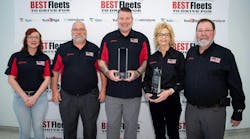Improving highway safety isn’t always about what happens behind the wheel or on the road. As fleets and owner-operators across the trucking industry prepare for the annual Commercial Vehicle Safety Alliance (CVSA) International Roadcheck program, Bendix Commercial Vehicle Systems offers insight on factors that affect the highway safety equation long before the turn of an ignition key: brake system upkeep, component selection and inspection, and technical know-how.The largest targeted commercial vehicle roadside inspection program in the world, this year’s 72-hour Roadcheck takes place June 2 through 4, and will involve approximately 10,000 CVSA-certified local, state, provincial, and federal inspectors across the United States, Canada, and Mexico. According to CVSA, Roadcheck has encompassed more than 1.4 million roadside inspections since its inception in 1988, resulting in an estimated 318 lives saved and 5,840 injuries avoided.“Without question, safer vehicles help create safer highways, and well-maintained vehicles are safer vehicles,” said Fred Andersky, Bendix director of government and industry affairs. “That’s why Bendix places such an emphasis on not just developing advanced safety technologies, but supporting fleets, drivers, and technicians with the parts, tools, and knowledge needed to keep their trucks on the road and in good working condition.”Beginning with the brakesDuring Roadcheck 2014, nearly 19% of vehicles inspected were found with violations leading to them being placed out of service. Brake-related violations accounted for almost half (46.2%) of the total out-of-service vehicle violations. Bendix recommends a two-level maintenance approach to help ensure safety and compliance: preventive maintenance in the form of regularly scheduled vehicle review, and pre-trip visual inspections by drivers checking for obvious brake system problems such as loose hoses or leaks.Regular and thorough brake system review should cover both components and operation:· Examine brake linings for proper thickness and condition (no edge cracks exceeding 1/16 inch in width or 1.5 inches in length; no cracks across the lining face extending through the edges; no missing material exposing rivets or bolts)· Conduct a 90 to 100 psi brake application and listen for audible leaks· Measure chamber stroke at each wheel-end“Both proper chamber stroke and good brake linings affect brake performance and stopping power, which means they have a direct impact on vehicle and highway safety,” said Gary Ganaway, director of OE and technical sales for Bendix. “Both also play a role in Compliance, Safety, Accountability (CSA) scoring for fleets and owner-operators.”Drivers can incur fines under CVSA guidelines if more than 25% of a truck’s wheel-ends are beyond the maximum allowable brake stroke, or out of adjustment.The right partsDuring routine maintenance such as brake relining, the right replacement parts are vital to ensure that original equipment (OE) manufacturer requirements are met, as well as compliance standards. The current generation of higher performing drum brakes, for instance, was designed to meet federal reduced stopping distance (RSD) regulations. Maintaining their stopping capability after relining means using high performance friction designed to meet those standards.“Introducing parts that haven’t been engineered to OE standards into a braking system can lead to problems ranging from reduced performance levels to faster wear,” Ganaway said. “Not all friction marketed as acceptable under the RSD standards will actually perform to that level, which is why Bendix recommends that fleets seek evidence of compliance from their friction supplier when it comes to replacing the friction on their RSD-equipped vehicles.”Additionally, fleets and owner-operators considering remanufactured brake shoes should choose providers that return the shoes to the shape engineered by their OE, as opposed to those that simply reline shoes with new friction. During their life cycle, brake shoes are subjected to tremendous amounts of force and drastic temperature changes, resulting in deformation. Relining a shoe that hasn’t been coined back to its original shape through a remanufacturing process can lead to problems, since the shoe no longer has the correct geometry to provide full contact and stopping power.Supporting technicians’ skillsCertified technicians are vital to fleet safety efforts, providing the invaluable knowledge and experience necessary to keep today’s vehicles – and their ever-advancing components and technologies – operating safely.“Providing technicians with the most current and in-depth training and information available, and offering it in formats and at times that meet their needs, has been an important part of Bendix’s safety commitment for more than half a century,” the company said.
Voice your opinion!
Voice your opinion!
To join the conversation, and become an exclusive member of FleetOwner, create an account today!
Latest from Drivers
Latest from Drivers


